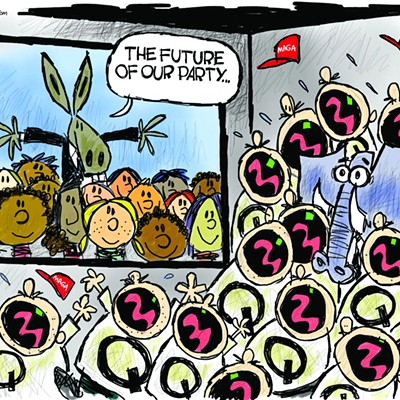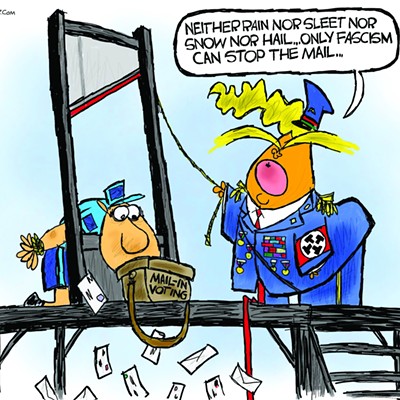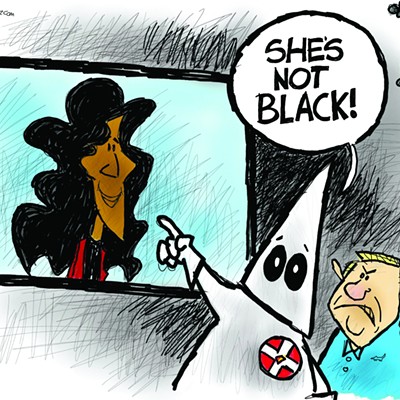The May election itself, which will ask voters to hike the sales tax within city limits to 8.1 percent, will cost an estimated $575,000, according to Michael Graham, spokesman for the Tucson Transportation Department.
In addition, the city's "Let's Go Tucson" program, which included television advertisements, public meetings, two separate surveys, staff time and other expenses, cost $374,095 between July 1 and December 10, when the program formally ended as the City Council voted to put the prop on the May ballot.
Since then, city staff has been working on the Transportation Improvement and Traffic Congestion Reduction Plan--or TITCRP--to provide voters with information about the transportation program. Graham said city staff had not broken down the cost to date of TITCRP as of press time, nor had the city established a budget for the program, which will include a media campaign developed by local firm Kaneen Advertising & Public Relations.
Since the city formally ended the "Let's Go Tucson" program, the name has been picked up by a business group which is campaigning to pass the proposition.
The new "Let's Go Tucson" committee is chaired by Katie Dusenberry, a former county supervisor who chaired the citizen committee that developed the transportation plan with city staff last fall.
The plan going before voters in May would raise an estimated $40 million a year for the next decade. Roughly 45 percent would go toward widening roads and building three grade-separated intersections; 37 percent would be spent on repairing residential streets; and 18 percent would fund mass transit.
Various sources have indicated the development and business communities hope to raise $500,000 for its campaign. Asked about the half-million-dollar figure, developer Stan Abrams, who also sat on the citizen committee, said the group would "spend as much as we think we need to spend to pass it."
The new "Let's Go Tucson" campaign is being directed by political consultant Pete Zimmerman, who has more than a decade of experience in city elections. His campaigns have included a countywide 1986 sales tax proposal rejected by 57 percent of voters and several efforts, some more successful than others, to persuade Tucsonans to accept direct delivery of CAP water to their homes.
Proposition critic Steve Farley, a graphic designer who co-founded Tucsonans for Sensible Transportation last year, questioned the Growth Lobby's use of the "Let's Go Tucson" slogan, saying it blurs the lines that prohibit the city from campaigning with tax dollars.
"The city has spent nearly $400,000 to build brand equity in the name 'Let's Go Tucson' as a city issue," Farley said. "And then they just hand it over to a private organization that is supporting something the city wants it to support, for all intents and purposes that's supporting the plan. It appears that this enables the city to electioneer without having to actually electioneer itself."
Farley has helped organize Citizens for a Sensible Transportation Solution, a political committee that opposes the sales tax.
"The plan has no vision except to continue the failed policies of the past," Farley said. "It's time that we said no to the forces of sprawl and congestion and this would be as convenient a time as any."
Citizens for a Sensible Transportation Solution, which is chaired by Andy Mosier, a graphic designer who draws the Weekly's "K. Rat" comic strip, recently debuted a Web site, www.savetucson.org, outlining reasons to oppose the transportation plan. Members hope to put an alternative plan that would include more road maintenance and transit funding on the November ballot.
A second opposition group, Enough!, filed its paperwork with the city earlier this week. Enough! is chaired by Debora Jordan, owner of the Suds Your Duds laundromat on the southwest corner of Grant and Campbell, where the city proposes to build a grade-separated intersection that would allow Grant Road to tunnel beneath Campbell Avenue. Merchants in the area complain construction of the GSI would wreck their businesses. (See "Street Sweep," February 14.)
Enough! includes former state lawmaker John Kromko, former Tucson City Councilwoman Molly McKasson, Tucson Weekly contributor Dave Devine and neighborhood activist Bonnie Poulos. The political activists used the same name for their successful campaign against the 1986 transportation half-cent sales-tax hike.
Devine said the group is concerned with both the regressive sales tax and the fate of small, locally owned businesses nearthe proposed GSIs. He said the campaign hopes to raise $10,000.
Like the city and the Growth Lobby committee, the two groups opposing the proposition have some crossover. Both Kromko and Mosier are plaintiffs in a suit against the city regarding the three grade-separated intersections included in the project.
The grade-separated intersections, which allow one street to pass beneath another, would be built at Grant Road and Campbell Avenue, Grant and Kolb roads and 22nd Street and Kino Boulevard. City staffers estimate the three intersections will cost $50 million, but critics predict the price could climb much higher.
The lawsuit, filed on February 5, alleges officials are violating the city charter's Neighborhood Protection Amendment, which requires that each grade-separated intersection be approved individually by the voters.
City Attorney Michael House said earlier this week that the city had not yet responded to the lawsuit, but would file a response within the 20-day deadline required by the court. He declined to share the city's legal strategy with the Weekly.
Voters can expect plenty of reading material when they get their information packets from the city. As of last week's deadline, 32 individuals or groups filed arguments with the city supporting the sales-tax plan, while at least 18 individuals or groups had filed arguments in opposition.

















